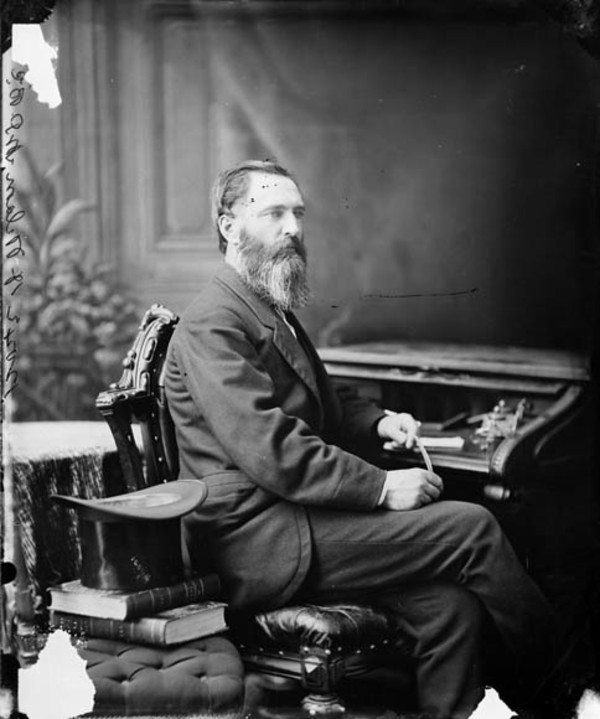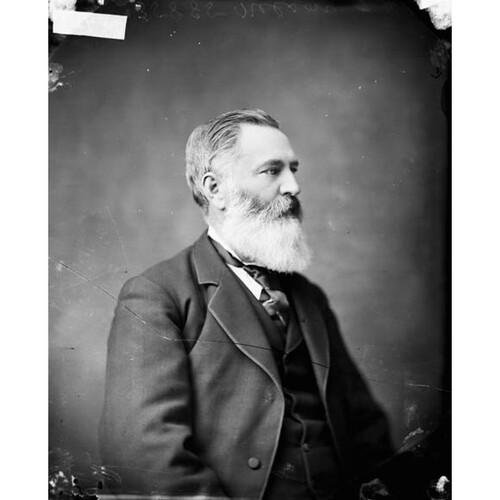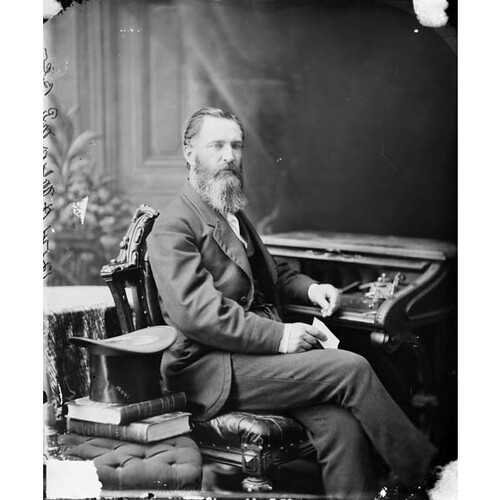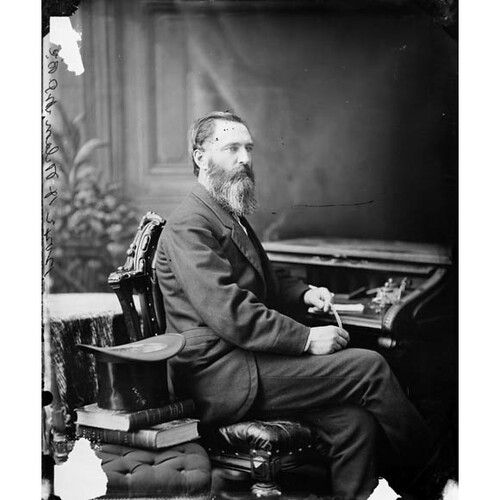NELSON, HUGH, businessman, politician, and office holder; b. 25 May 1830 in Larne (Northern Ireland), son of Robert Nelson, owner of a linen factory, and Frances Quinn; m. 17 Sept. 1885 Emily Stanton in Ottawa; d. 3 March 1893 in London, England.
Hugh Nelson attended local schools before leaving Larne in 1854 for California, where he may have worked as an accountant. On 15 June 1858 he arrived on Vancouver Island, intending to join the Fraser River gold-rush. In 1861 he was secretary of the Yale Steam Navigation Company and the next spring he constructed a warehouse in Yale capable of holding 500 tons of merchandise. That fall he and George Dietz bought out William T. Ballou’s Pioneer Fraser River Express. Dietz and Nelson’s British Columbia and Victoria Express provided a link between California and the Cariboo district by connecting at Yale and Lillooet with Francis Jones Barnard*’s Cariboo Express, and at Victoria with Wells, Fargo and Company, which operated between California and Victoria. On 22 June 1864 Barnard, Dietz, and Nelson obtained the government contract to deliver mail to the Cariboo, which originally was to bring them £5,000 a year, but they were constantly negotiating with the government for more money.
In December 1867 Dietz and Nelson sold their company to Barnard, possibly because the previous year they had formed a partnership with Sewell Prescott Moody*, who had a sawmill on Burrard Inlet. The partners’ capital probably enabled Moody to build a new steam-mill in 1868 equipped with the latest machinery. The firm, referred to as Moody, Dietz and Nelson by 1870, continued to prosper until the fall of 1873, when the mill was destroyed by fire. Operations resumed the next May and, following the death of Moody in November 1875, Nelson managed the company until his retirement from business in 1882.
While pursuing his business interests, Nelson was also interested in politics. He joined the Confederation League founded in May 1868 by Amor De Cosmos and his allies, and, along with his former partner Barnard, he was a delegate that fall to the league’s Yale Convention, which called for union with Canada and responsible government. In 1870 Nelson was elected to the Legislative Council of British Columbia for New Westminster, and after the colony joined confederation in 1871 he represented that constituency in the House of Commons. In the election that followed the dissolution of parliament in July 1872 he was returned by acclamation.
A consistent supporter of Sir John A. Macdonald, Nelson decided to leave politics after the Pacific Scandal in 1873 forced the prime minister out of office. When Macdonald returned to power in 1878 he did not forget the support Nelson had given him, and Nelson was appointed to the Senate on 12 Dec. 1879.
While in Ottawa, Nelson met and married the daughter of Isaac Brock Stanton, a senior civil servant. Still in Macdonald’s favour, Nelson was appointed lieutenant governor of British Columbia on 8 Feb. 1887. It was a good choice since the Nelsons liked to entertain. Indeed, garden parties, formal dinners, and balls were a regular occurrence at Cary Castle in Victoria while the Nelsons were there. In the autumn of 1892 Nelson resigned and went to England, where he died the following March of Bright’s disease.
Nelson’s life is difficult to assess. As a businessman he was always in partnership with others, so that his role in the various companies cannot easily be determined. His career as an elected politician was short; he was a supporter of union with Canada and sought the extension of the Canadian Pacific Railway to the Pacific coast, but it cannot be claimed that he was instrumental in achieving these goals. In his appointed offices as senator and lieutenant governor he fulfilled his duties as required, but the very nature of these positions precluded any political initiative on his part. All that one can say with any degree of certainty is that he was a competent and honest businessman and politician.
PABC, E/C/N331.2; GR 443, 29, 32; GR 1372, F 245, 14 Nov. 1870; F 332, 6 June 1864; F 334, 13 May 1865; F 472; F 1233. Daily Colonist (Victoria), 10 May 1862; 11–12 Nov. 1870; 5, 22 Dec. 1871; 24 Aug. 1872; 24 Feb. 1887; 16 Oct. 1892; 7, 30 March 1893. Daily News-Advertiser (Vancouver), 2 Dec. 1887. Examiner (Yale, B.C.), 11 Dec. 1866. Mainland Guardian (New Westminster, B.C.), 2 July, 2, 16 Nov. 1870; 24 Aug. 1872; 25 Dec. 1873. Vancouver Daily World, 7 March 1893. Kerr, Biog. dict. of British Columbians. Wallace, Macmillan dict. A. S. Deaville, The colonial postal systems and postage stamps of Vancouver Island and British Columbia, 1849–1871 . . . (Victoria, 1928). J. E. Flynn, “Early lumbering on Burrard Inlet, 1862–1891” (basc thesis, Univ. of B.C., Vancouver, 1942). R. E. Gosnell, A history of British Columbia (n.p., 1906). S. W. Jackman, The men at Cary Castle; a series of portrait sketches of the lieutenant-governors of British Columbia from 1871 to 1971 (Victoria, 1972). J. [W.] Morton, The enterprising Mr. Moody, the bumptious Captain Stamp: the lives and colourful times of Vancouver’s lumber pioneers (North Vancouver, 1977). F. W. Howay, “Early settlement on Burrard Inlet,” BCHQ, 1 (1937): 101–14. G. E. Wellburn, “Dietz & Nelson’s British Columbia & Victoria Express,” Popular Stamps (Cobden, Ont.), 8 (1945), no.10: 5–6.
Cite This Article
Zane H. Lewis, “NELSON, HUGH,” in Dictionary of Canadian Biography, vol. 12, University of Toronto/Université Laval, 2003–, accessed January 20, 2025, https://www.biographi.ca/en/bio/nelson_hugh_12E.html.
The citation above shows the format for footnotes and endnotes according to the Chicago manual of style (16th edition). Information to be used in other citation formats:
| Permalink: | https://www.biographi.ca/en/bio/nelson_hugh_12E.html |
| Author of Article: | Zane H. Lewis |
| Title of Article: | NELSON, HUGH |
| Publication Name: | Dictionary of Canadian Biography, vol. 12 |
| Publisher: | University of Toronto/Université Laval |
| Year of revision: | 1990 |
| Access Date: | January 20, 2025 |






